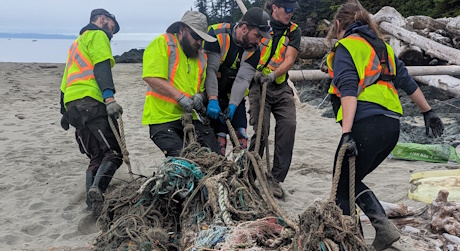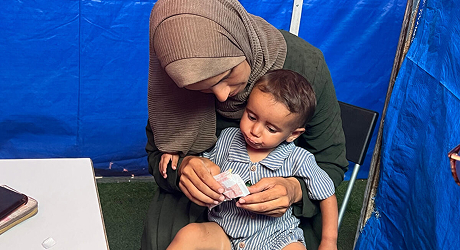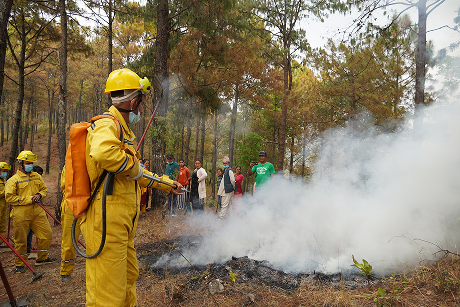Footprints Project
Since 2005, travelers like you have helped us change the world through micro-donations.
-
A total of
3809
Travelers
-
donated
$25004.19
(100% funded) -
to help improve
Peace and Justice
-
impacting
509
people -
in
Bangladesh
Project Background
While there has been much progress to establish effective Civil Registration Vital Statistics (CRVS) systems in Bangladesh, birth and death registration rates remain low, with only 23% of births and 22% of deaths being registered within one year of occurrence.
Accurate statistics are important for a number of reasons. Through the provision of a legal identity from birth, a child is recognised in the eyes of law which protects them from exploitation and abuse and enables access to services. A death registration certificate protects families and their rights within the law by providing documentation that proves when an individual has passed away. And with timely and accurate population data, governments and the private sector can make evidence-based decisions and service provisions for vaccinations or responding to fatal disease outbreaks.
The OpenCRVS project was implemented within two sub-districts of Bangladesh, Narsingdi and Joymonirhat, with the aim to evaluate the effectiveness of new digitised models of civil registration and to assess the long-term potential of OpenCRVS to strengthen CRVS systems in Bangladesh.
Key Project Activities
The key objectives of the project were to see an increase in the number of boys and girls that are registered and issued with a birth certificate. increase the number of death registrations and issuance of death certificate and reduce processing time for both.
To ensure that national birth and death registration legislation and policies are rights-based and reflect minimum standards to ensure the right of women and girls to register, regular bi-monthly steering committee meetings with the Government of Bangladesh took place. These meetings discussed the project status, issues and where the commitment to the protection of vulnerable populations was conveyed. An in-pandemic CRVS strategy was developed and shared with the Government of Bangladesh and health and safety equipment (gloves, masks, sanitiser) were distributed at project sites in Narsingdi and Joymonirhat.
In Narsingdi Municipality, training for OpenCRVS was conducted over two days. In total, 35 participants (18 female, 17 male) were present, primarily health assistants and health inspectors. Training materials and Standard Operating Procedures were designed, developed, and delivered to all Government of Bangladesh CRVS staff and other key stakeholders within the community. Sensitization and training sessions in Bhurungamari also took place.
An open source, standards-based, affordable core CRVS software product was built, tested and is now available for deployment in other low-resource environments globally. OpenCRVS was tested by the Bangladesh Computer Council and by an independent UK tester based on UK government standards.

Key Project Outcomes
- 49% increase in birth registrations
- 45% increase in death registrations
- In rural areas, OpenCRVS enabled Community Health Assistants to send digital notifications of birth and death which led to large increases in completeness rates within 1 year of occurrence (from 14% to 63% and from 2% to 47% respectively)
- Technical interoperability was proven between OpenCRVS and other eGovernment systems. DHIS2 was able to generate notifications of both birth and death at the health facility level and securely transfer this data to OpenCRVS; the National ID system was able to validate the NID numbers of applicants for OpenCRVS in real time
- In Narsingdi (urban), within a 3.5-month period, there were a total of 344 birth registrations – 164 male and 180 female
- In Joymonirhat (rural), within a 6-month period, there were a total of 165 birth registrations – 79 male and 86 female
- In Narsingdi, within a 3.5-month period, there were a total of 4 death registrations – all male
- In Joymonirhat, within a 6-month period, there were a total of 28 death registrations – 18 male and 10 female
- OpenCRVS has been integrated with the National ID system (NID) and health management system (DHIS2) during the project pilot. OpenCRVS can verify the ID of citizens in real-time and captures birth and death notifications from health systems instantly.
- OpenCRVS has been formally recognised as a Digital Public Good (DPG) by the Digital Public Goods Alliance. One of only seven globally, it has now been recommended by the Pacific Civil Registrar Network as the only suitable CRVS software solution due to its lack of lock-in licensing fees, interoperability with government systems, and its promotion of shared asset approaches to system strengthening in the Pacific region
- OpenCRVS simplified the registration process for staff within the offices of the Union Parishad/Municipality which meant that less time was spent on processing individual applications
- The families of those being registered found that the whole registration process was more streamlined and less visits were required.
- The Bangladesh Computer Council found the OpenCRVS implementation to be highly secure and effective against cyber security threat.
- No duplicate entries were made due to the duplication checker feature thus leading to a high degree of data accuracy

Community involvement
The OpenCRVS project worked closely with the CRVS Secretariat, Cabinet Division, Office of the Registrar General and the Directorate General of Health Services within the Government of Bangladesh.
The project worked with the Dhaka-based company Dynamic Solutions Innovators (DSI) who supported the contextualisation of OpenCRVS in Bangladesh and worked with local registration actors to integrate OpenCRVS within the existing digital health infrastructure and the national ID system thus improving the quality of the registration process.
Community health assistants and workers were trained how to operate OpenCRVS. Mahzana Shammi, a health assistant in Joymonirhat said, “I feel very proud as I am involved in the initiative to ensure the birth rights of every child and helping family members with death registration. I feel that I am giving back my debt to society.”
In their own words, members of the community have shared their experiences:
“It was a very easy process to initiate the application, as Hamida Apa took a picture of my and wife’s NID and we collected the certificate with only one visit to Narsingdi Municipality. as a father, I am relieved that I have ensured the first legal right of my child.” - Anisur Rahman, after the birth of their daughter.
“The most exceptional gift from the hospital was the news that the birth registration application of my newborn twin has been started from the hospital.” - Bandana Rani Das, a proud mother of newborn twin babies.
What's next?
Following the pilot’s phase-one successes, the Government of Bangladesh requested an expansion of OpenCRVS into marriage registration. This activity is currently being scoped through design research that will continue into this period.
Phase two will look at expanding and piloting the open sources CRVS software into the Pacific. The aim will be to pilot a shared-asset approach to CRVS digitisation in the Pacific, a core strategic goal of the Pacific Civil Registrars Network (PCRN).
Plan International will work with the Government of Niue to design, develop, and deploy a CRVS software solution. Developing a digital solution that meets Niue’s unique CRVS needs, this pilot will be documented and demonstrated to other interested Pacific countries.
Niue has been selected as the first Pacific implementation of OpenCRVS. Investing in OpenCRVS for Niue will result in a production-ready CRVS software solution for birth and death registration, and with minor configuration can be rolled out in other neighbouring countries who are also wanting to digitise their CRVS system. The pilot will be based on and use learnings from the successful first phase of this project in Bangladesh.
Traveling soon? When you buy travel insurance with us, you can make a contribution towards a cause you care about.
Get a quote






